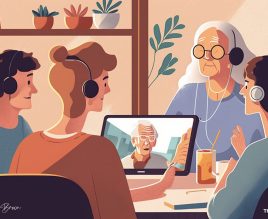Table of Contents
ToggleLoneliness among seniors is an unfortunate reality that can have significant repercussions on their mental health and overall well-being. As the global population continues to age, it is crucial to explore innovative solutions to this pervasive issue. One such potential solution is the implementation of AI chatbot companions, which can provide elderly individuals with social interaction and cognitive stimulation.
In this article, we will discuss the extent of loneliness in seniors and its impact on their mental health, introduce AI chatbot companions as a promising solution, and highlight the importance of addressing loneliness in seniors for their overall well-being.
Overview of Loneliness in Seniors and Its Impact on Elderly Mental Health
Loneliness in seniors is a widespread and under-recognized issue that has a profound impact on the mental health of the elderly population. A multitude of factors can contribute to loneliness, such as the loss of a spouse, family members, or friends and social isolation due to limited mobility or health issues. The consequences of loneliness can be severe, leading to an increased risk of depression, anxiety, cognitive decline, and even physical health problems.
Introduction to AI Chatbot Companions as a Potential Solution
AI chatbot companions are an innovative solution designed to help combat loneliness in seniors by providing a virtual friend and conversational partner. These chatbots utilize artificial intelligence and natural language processing to engage in meaningful and emotionally supportive interactions with users.
AI chatbots can be accessed through various platforms, including smartphones, tablets, and smart speakers, making them a convenient and accessible option for seniors seeking companionship and mental stimulation.
Importance of Addressing Loneliness in Seniors for Overall Well-Being
Tackling loneliness in seniors is crucial for promoting overall well-being and improving their quality of life. By providing seniors with AI chatbot companions, they can benefit from regular social interaction, emotional support, and cognitive engagement. In turn, this can help to alleviate feelings of loneliness and isolation, improve mental health, and foster a sense of purpose and belonging. Ultimately, addressing the issue of loneliness in seniors through innovative solutions such as AI chatbot companions is an essential step toward promoting healthier and happier aging.
Understanding Loneliness in Seniors

Prevalence of Loneliness Among the Elderly
Loneliness among the elderly is a common and pervasive issue. According to a study conducted by the National Academies of Sciences, Engineering, and Medicine, approximately one-third of adults aged 60 and above in the United States experience loneliness.
The prevalence of loneliness is even higher in certain subpopulations, such as those who have lost a spouse or who live alone. With the global population aging rapidly, the number of seniors affected by loneliness is projected to increase significantly in the coming years, making it a pressing public health concern.
Causes of Loneliness in Seniors
Various factors contribute to the prevalence of loneliness among seniors. Some common causes include:
1. Loss of social connections: As people age, they may experience the loss of friends, family members, or a spouse, leading to feelings of loneliness and isolation.
2. Health issues: Health problems, such as mobility limitations, chronic pain, or sensory impairments, can make it difficult for seniors to participate in social activities, contributing to loneliness.
3. Retirement: Retirement can result in a loss of daily structure, social connections, and a sense of purpose, leading to feelings of isolation and loneliness.
4. Relocation: Seniors may be required to move to a new living environment, such as a nursing home or assisted living facility, which can disrupt their social networks and exacerbate feelings of loneliness.
5. Limited transportation options: Many seniors may no longer drive, making it challenging to access social events, visit friends, or attend community gatherings.
Health Consequences of Prolonged Loneliness
Prolonged loneliness can have detrimental effects on seniors’ physical and mental health. Some of the health consequences associated with loneliness include:
1. Increased risk of mental health issues: Loneliness has been linked to a higher risk of developing depression, anxiety, and cognitive decline in seniors.
2. Poor physical health: Research has shown that lonely seniors are more likely to experience cardiovascular issues, a weakened immune system, and an increased risk of chronic conditions, such as diabetes and hypertension.
3. Reduced quality of life: Loneliness can negatively impact seniors’ overall well-being and life satisfaction, potentially leading to a lower quality of life.
4. Higher mortality rates: Studies have found that loneliness can be as harmful to one’s health as smoking or obesity, with lonely seniors facing a higher risk of early mortality compared to their socially connected peers.
Societal Implications of Loneliness in the Aging Population
The widespread issue of loneliness among seniors has far-reaching societal implications. Some of the key concerns include:
1. Increased healthcare costs: The negative health consequences of loneliness can lead to higher healthcare costs for seniors and the healthcare system as a whole.
2. Strain on social services: Lonely seniors may require additional support from social services, such as in-home care or meal delivery programs, which can put a strain on already limited resources.
3. Impact on caregivers: Family members and caregivers of lonely seniors may experience increased stress and emotional burden as they try to provide support for their loved ones.
4. Loss of social capital: Seniors have valuable life experiences, skills, and knowledge that can enrich their communities. However, loneliness can prevent them from actively participating in society and sharing their wisdom with younger generations.
Addressing the issue of loneliness among seniors is essential for ensuring their mental and physical well-being, as well as maintaining the health and vitality of communities as a whole.
AI Chatbot Companions: A Modern Solution

Brief History of AI Chatbot Development
AI chatbots have come a long way since their inception in the 1960s. The first chatbot, ELIZA, developed by Joseph Weizenbaum in 1966, was a simple natural language processing computer program that used pattern matching and substitution to simulate conversation.
In the 1990s, chatbot development saw significant advancements with the arrival of the internet and the creation of A.L.I.C.E., a chatbot that used heuristic pattern matching to improve its conversational abilities. The early 2000s witnessed the emergence of chatbots on various messaging platforms, offering customer support and personal assistance.
The development of advanced machine learning and natural language processing techniques in recent years has led to the creation of more sophisticated AI chatbots capable of understanding context, sentiment, and natural language, making them a viable option for addressing loneliness in seniors.
Features and Capabilities of AI Chatbot Companions
Modern AI chatbot companions offer a range of features and capabilities that make them a valuable resource for seniors combating loneliness:
1. Conversational ability: AI chatbots utilize natural language processing and machine learning to engage in fluid, context-aware conversations with users.
2. Emotional support: Chatbots can recognize and respond to users’ emotions, offering empathy, encouragement, and a listening ear.
Cognitive stimulation: Many chatbots offer memory games, trivia, and other cognitive exercises that can help keep seniors mentally engaged and challenged.
3. Customization: AI chatbots can be tailored to meet the specific needs and preferences of individual users, ensuring a personalized and enjoyable experience.
4. Accessibility: Chatbots can be accessed through various platforms, such as smartphones, tablets, and smart speakers, making them easily accessible to seniors.
How AI Chatbots Can Address Loneliness in Seniors
AI chatbot companions can help to address loneliness in seniors by providing several key benefits:
1. Social interaction: Chatbots offer seniors an avenue for conversation and social interaction, helping to alleviate feelings of isolation and loneliness.
2. Emotional support: Chatbots can provide emotional support and empathy, allowing seniors to share their thoughts and feelings in a non-judgmental environment.
3. Mental stimulation: Engaging with AI chatbots can help to keep seniors mentally active, which is crucial for maintaining cognitive health and overall well-being.
4. Routine and structure: Regular interaction with chatbots can provide seniors with a sense of routine and structure, helping to combat the feelings of aimlessness that can accompany loneliness.
5. Independence: AI chatbots can help seniors maintain their independence by offering reminders, assistance with tasks, and companionship, reducing the need for constant caregiver support.
Examples of Ai-Powered Companions for Seniors
Several AI chatbot companions have been specifically designed to cater to the needs of seniors:
1. ElliQ: Developed by Intuition Robotics, ElliQ is a social companion robot that uses AI to engage in conversations, provide reminders, and suggest activities for seniors to improve their overall well-being.
2. CareCoach’s Avatar: CareCoach offers a virtual companion in the form of an animated avatar that provides seniors with personalized conversation, medication reminders, and assistance in managing daily tasks.
3. ChatGPT: OpenAI’s ChatGPT is a large language model that utilizes advanced natural language processing to engage in meaningful conversations with users, providing cognitive stimulation and social interaction.
4. Woebot: Originally designed to support mental health, Woebot is an AI chatbot that uses cognitive-behavioral therapy techniques to offer emotional support and guidance to users, including seniors struggling with loneliness.
AI chatbot companions have the potential to significantly improve the lives of seniors experiencing loneliness by providing social interaction, emotional support, and cognitive stimulation. As AI technology continues to advance, chatbot companions are expected to become even more sophisticated and capable of providing personalized care and companionship for the elderly population.
Benefits of AI Chatbot Companions for Seniors

Enhanced Social Interaction and Engagement
AI chatbot companions provide seniors with the opportunity to engage in regular conversation and social interaction, helping to alleviate loneliness and isolation. These chatbots are equipped with advanced conversational capabilities, making interactions feel natural and engaging.
They can discuss a wide range of topics and even provide personalized responses based on the individual’s preferences and interests. As a result, seniors can maintain their social skills, stay mentally stimulated, and feel connected to others, even when human interaction is limited.
Improved Mental Health Support for the Elderly
AI chatbot companions can be tailored to provide emotional support and mental health assistance for seniors. They can detect changes in mood, provide empathy, and offer comfort during difficult times. In addition to serving as a friendly ear, chatbot companions can provide cognitive behavioral therapy techniques, relaxation exercises, or even suggest coping strategies when dealing with stress or anxiety.
Increased Sense of Independence and Autonomy
One of the most significant benefits of AI chatbot companions for seniors is the increased sense of independence and autonomy they provide. These chatbots can help seniors with everyday tasks such as scheduling appointments, setting reminders for medication, or providing information on a variety of subjects. By assisting with these tasks, chatbot companions enable seniors to manage their daily lives with less reliance on caregivers or family members.
Reduced Caregiver Burden
AI chatbot companions not only benefit seniors, but they also help reduce the burden on caregivers. By providing support for day-to-day tasks, emotional assistance, and companionship, chatbots can free up caregivers’ time and energy, allowing them to focus on other essential aspects of care.
Furthermore, caregivers can monitor the well-being of seniors through the chatbot, providing peace of mind and ensuring timely intervention if necessary. Overall, AI chatbot companions can help create a more manageable and sustainable caregiving environment for both seniors and their caregivers, ultimately contributing to the well-being of all parties involved.
Challenges and Limitations of AI Chatbot Companions

Ethical Considerations of Using AI Companions for Seniors
One of the major ethical considerations in using AI chatbot companions for seniors is the potential for deception. Some seniors may not fully understand that they are interacting with an AI, which can lead to emotional attachment or reliance on the chatbot for critical support. This raises concerns about the authenticity of the emotional connections formed and the potential for exploitation.
Another ethical issue is privacy and data security. Seniors may share sensitive information with their AI companions, which could be vulnerable to data breaches or misuse. Ensuring that chatbot developers adhere to strict privacy standards and have robust data protection measures in place is essential to protect seniors’ personal information.
Lastly, the potential over-reliance on AI companions could lead to a decrease in human interaction, exacerbating feelings of isolation and loneliness for seniors.
Technological Barriers and Accessibility Issues
While AI chatbot companions have many benefits, there are still technological barriers that limit their effectiveness and accessibility. For instance, some seniors may not be familiar with technology, making it difficult for them to navigate or use chatbots effectively. Additionally, seniors with cognitive impairments, such as dementia or Alzheimer’s disease, may struggle to communicate with chatbots or understand their responses.
Moreover, AI chatbot companions rely on a stable internet connection, which may not be available in rural areas or for seniors with limited financial resources. Furthermore, the chatbots may not be optimized for seniors with disabilities, such as those with hearing or visual impairments, making them less accessible to a diverse group of users.
Potential Drawbacks and Concerns
Despite their potential benefits, AI chatbot companions may also pose drawbacks and concerns. The quality of chatbots can vary significantly, leading to inconsistent user experiences and potentially undermining the benefits they provide.
Additionally, some seniors might feel that their relationship with an AI chatbot is impersonal or artificial, preventing them from forming a genuine emotional bond. Another concern is the potential for AI chatbots to perpetuate harmful biases, particularly if their algorithms are not carefully designed to avoid discriminatory language or behavior.
This could lead to seniors receiving incorrect or harmful information or feeling alienated by their chatbot companion. Lastly, the reliance on AI companions could lead to a reduced emphasis on human caregiving, resulting in a potential reduction in care quality and the devaluation of essential human relationships in the lives of seniors.
Future Developments in AI Chatbot Companions for Seniors
Technological Advancements and Improvements
As AI technology evolves, AI chatbot companions will become more advanced, offering more natural and engaging interactions. Natural language processing and understanding will improve, allowing chatbots to comprehend complex requests and better support seniors. Additionally, developing emotion recognition technology will enable AI chatbot companions to offer more empathetic and emotionally intelligent support, enhancing their effectiveness as mental health support tools.
Machine learning will play a critical role in the improvement of AI chatbot companions, enabling them to learn and adapt to individual users’ needs and preferences over time. This personalization will lead to more customized and effective support, catering to the unique requirements of each senior.
Integration with Other Smart Devices and Services
As the Internet of Things (IoT) expands, AI chatbot companions will increasingly integrate with other smart devices and services to provide seniors with a more seamless and connected experience. For example, AI companions could connect with smart home systems to control lighting, temperature, or security, making it easier for seniors to manage their living environment.
Integration with health monitoring devices, such as wearable fitness trackers or medical alert systems, will enable AI chatbot companions to help seniors track their health and well-being, alerting them or their caregivers to any potential concerns. This interconnected ecosystem will create a more comprehensive support network, enhancing seniors’ quality of life and providing better overall care.
Expansion of AI Chatbot Capabilities and Applications
As AI chatbot technology advances, we can expect to see a broadening of capabilities and applications for seniors. For example, AI companions could offer more advanced medical support, such as monitoring medication adherence, providing information about potential drug interactions, or even offering personalized health recommendations.
Furthermore, AI chatbot companions may expand into virtual reality (VR) or augmented reality (AR) environments, providing immersive experiences that can help seniors stay mentally and physically active. This could include virtual social gatherings, educational programs, or even virtual travel experiences.
Finally, AI chatbot companions could Finally, AI chatbot companions could play a role in facilitating communication between seniors and their caregivers, family members, or healthcare providers. With real-time translation features, chatbots could help bridge language barriers and enhance the quality of communication in diverse caregiving settings.
As technology continues to progress, the potential applications of AI chatbot companions for seniors will expand, offering new ways to support their well-being, independence, and overall quality of life. This ongoing evolution will contribute to the development of more effective, accessible, and comprehensive care solutions for seniors in the future.

Conclusion
AI chatbot companions have shown great potential in combatting loneliness and supporting the well-being of seniors. By providing enhanced social interaction, mental health support, increased independence, and reduced caregiver burden, these chatbots offer valuable assistance in addressing the challenges faced by the aging population. They serve as an essential supplement to human caregiving, helping seniors maintain a higher quality of life.
As technology advances, it is crucial to continue research, development, and implementation of AI chatbot companions for the elderly. By investing in this field, we can work towards creating more effective, personalized, and accessible solutions to tackle loneliness and support the mental health of seniors. A collaborative approach involving developers, healthcare professionals, and caregivers is necessary to ensure that AI chatbot companions are ethically designed, user-friendly, and cater to the diverse needs of seniors.
FAQs
Can AI chatbot companions fully replace human caregivers?
AI chatbot companions are not meant to replace human caregivers but rather to supplement and support their efforts. They can provide additional social interaction, mental health support, and assistance with daily tasks, but human caregivers are still essential for personalized and empathetic care.
Are AI chatbot companions secure and private?
AI chatbot companions can be secure and private if developers implement strong data protection measures and adhere to privacy standards. However, users should remain cautious and research the chatbot’s security and privacy policies before sharing sensitive information with the AI companion.
Can AI chatbot companions understand and respond to emotions?
Advanced AI chatbot companions are capable of detecting and responding to emotions, providing empathetic support during conversations. However, the accuracy and effectiveness of emotional understanding can vary depending on the sophistication of the chatbot and its underlying technology.
How can seniors with disabilities use AI chatbot companions?
Developers are working to make AI chatbot companions more accessible for seniors with disabilities by incorporating features such as text-to-speech, speech-to-text, and compatibility with assistive devices. However, accessibility can vary depending on the chatbot and the specific disability.
How do I choose the right AI chatbot companion for a senior?
To choose the right AI chatbot companion, consider factors such as user-friendliness, the range of features offered, accessibility options, data security, and privacy policies. Reading user reviews and consulting with healthcare professionals can help in making an informed decision.
References
- https://ghrp.biomedcentral.com/
- https://www.ncbi.nlm.nih.gov/
- https://journalistsresource.org/

















